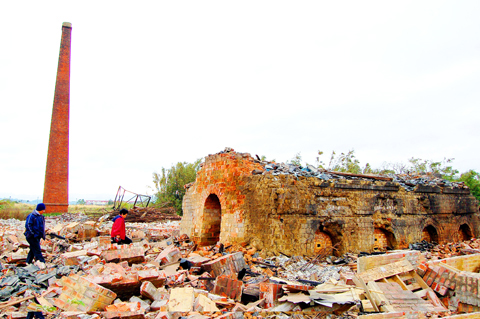After the Miaoli County Government razed three kilns that served as the last witness to the county’s once-prosperous pottery industry, preservationists set up a commemorative Web site and pledged to take action against county government officials who backed down from an agreement with the Council for Cultural Affairs (CCA) to postpone the demolition.
“This is not the time for us to mourn: We must keep fighting,” Yang Chang-chen (楊長鎮), a Miaoli native and long-time activist for local culture preservation, wrote in a message posted on the site.
Yang said he would write a petition to the Control Yuan, requesting a probe into Miaoli County Commissioner Liu Cheng-hung (劉政鴻) and potential impeachment.

PHOTO: PENG CHIEN-LI, TAIPEI TIMES
The three kilns were located in Miaoli’s Houlong Township (後龍) and were surrounded by rice fields and farms.
The area had a flourishing industry producing pottery, china, tiles and bricks during the Japanese colonial period.
As the nation’s economy developed, the old-fashioned labor-intensive kilns that once dotted the area became outdated. Eventually they were either closed, demolished or turned into factories that produce pottery with modern technology and equipment.
In 2003, however, the county government said it would build a station for the high-speed rail nearby and drew up an urban development project to turn the surrounding area into a transportation hub and high-tech industrial zone.
After the plans were drawn up, a county cultural heritage assessment commission said the three remaining old-style kilns were not of “enough historic value for preservation” and could be torn down.
Local historians and activists were upset by the decision and formed the Alliance to Rescue the Historic Kilns of Miaoli.
More than 50 civic groups across the country and nearly 600 individuals signed a petition asking the authorities to preserve the kilns.
“Miaoli can only become an attractive place for visitors if we preserve all these places with history and memory,” Den Shui-hui (鄧淑慧), founder of the alliance and owner of a traditional snake-shaped kiln in nearby Jhunan Township (竹南) told the Taipei Times via telephone.
“These kilns were hand-built and each of the bricks used was hand-made,” Den said.
“Many of the bricks actually bear some kind of mark on them and each mark has a story behind it,” Den said.
Den is also a researcher who has authored eight books on kilns in Miaoli.
The activists took their case to the CCA.
Last Tuesday, the council said it would ask the Miaoli County Government to halt the demolition and wait for the results of further negotiations with the activists.
Despite all the efforts, two of the three kilns were torn down on Thursday.
On the same day, the council released a statement expressing regret over the demolition and said it had reached an agreement with the county government to “postpone demolition until after a negotiation meeting on Jan. 14 to spare the remaining bun-shaped kiln.”
The last kiln, however, was torn down on Friday.
“We demand apologies from the CCA and County Commissioner Liu and we demand that the head of the county’s International Culture and Tourism Bureau, Lin Chen-feng [林振豐], step down. We’ll also sue him,” Den said.

Chinese Nationalist Party (KMT) Chairman Eric Chu (朱立倫), spokeswoman Yang Chih-yu (楊智伃) and Legislator Hsieh Lung-chieh (謝龍介) would be summoned by police for questioning for leading an illegal assembly on Thursday evening last week, Minister of the Interior Liu Shyh-fang (劉世芳) said today. The three KMT officials led an assembly outside the Taipei City Prosecutors’ Office, a restricted area where public assembly is not allowed, protesting the questioning of several KMT staff and searches of KMT headquarters and offices in a recall petition forgery case. Chu, Yang and Hsieh are all suspected of contravening the Assembly and Parade Act (集會遊行法) by holding

PRAISE: Japanese visitor Takashi Kubota said the Taiwanese temple architecture images showcased in the AI Art Gallery were the most impressive displays he saw Taiwan does not have an official pavilion at the World Expo in Osaka, Japan, because of its diplomatic predicament, but the government-backed Tech World pavilion is drawing interest with its unique recreations of works by Taiwanese artists. The pavilion features an artificial intelligence (AI)-based art gallery showcasing works of famous Taiwanese artists from the Japanese colonial period using innovative technologies. Among its main simulated displays are Eastern gouache paintings by Chen Chin (陳進), Lin Yu-shan (林玉山) and Kuo Hsueh-hu (郭雪湖), who were the three young Taiwanese painters selected for the East Asian Painting exhibition in 1927. Gouache is a water-based

Taiwan would welcome the return of Honduras as a diplomatic ally if its next president decides to make such a move, Minister of Foreign Affairs Lin Chia-lung (林佳龍) said yesterday. “Of course, we would welcome Honduras if they want to restore diplomatic ties with Taiwan after their elections,” Lin said at a meeting of the legislature’s Foreign Affairs and National Defense Committee, when asked to comment on statements made by two of the three Honduran presidential candidates during the presidential campaign in the Central American country. Taiwan is paying close attention to the region as a whole in the wake of a

OFF-TARGET: More than 30,000 participants were expected to take part in the Games next month, but only 6,550 foreign and 19,400 Taiwanese athletes have registered Taipei city councilors yesterday blasted the organizers of next month’s World Masters Games over sudden timetable and venue changes, which they said have caused thousands of participants to back out of the international sporting event, among other organizational issues. They also cited visa delays and political interference by China as reasons many foreign athletes are requesting refunds for the event, to be held from May 17 to 30. Jointly organized by the Taipei and New Taipei City governments, the games have been rocked by numerous controversies since preparations began in 2020. Taipei City Councilor Lin Yen-feng (林延鳳) said yesterday that new measures by